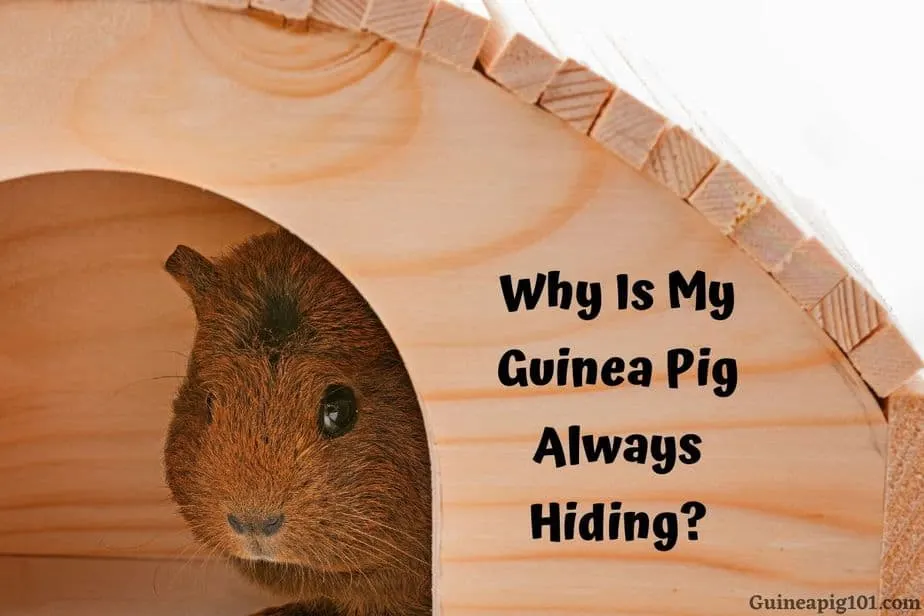Many owners often wonder why is their guinea pig always hiding? Are they ill? Are they scared? There was a time when I was wondering the exact same thing. So, I decided to do some research and here is what I have learned.
Guinea pigs are prey animals, and it is their natural instinct to hide. Insecurity and illness are one of the significant reason that encourages their hiding behavior. Other factors include loud noises, predators, sudden movement, or even fear of the new environment.
In most cases, a guinea pig’s hiding behavior is out of shy nature, fear, and insecurity.
However, there are some caveats. Sometimes, a guinea pig’s hiding behavior-especially when it is unusual or sudden, can indicate a potential health problem.
Guinea pigs are prey animals, and they tend to hide their illness until it gets severe.
Thus, it is crucial to look out for the same to avoid life-threatening situations in your guinea pigs.
There is a lot more to learn about the hiding behavior of your guinea pigs and what you should be doing about it. So, I would encourage you to read this article till the end so you can understand it in detail.
Is it normal for guinea pigs to hide?
Yes, it is entirely natural for guinea pigs to hide. However, you should be concerned if there is a change in their behavior or when they are hiding more than usual.
For example: When you bring a new guinea pig home, you might notice they are hiding whenever you are around.
However, with time they will get used to your presence and not hide like they used to.
But if you suddenly notice that your guinea pig started hiding more than usual or they are not coming out even to eat their food, then it does indicate something is wrong with them.
Now it could simply be something in their living environment that is frightening them like a loud noise or your other household pets like a bird or a cat or a dog.
It can also be due to some illness they are trying to hide. Thus, you should be cautious if their hiding behavior is sudden and unusual. It can be ignored otherwise.
What does it mean when a guinea pig hides?
There could be a lot of reasons that encourage your guinea pigs to hide.
While some of them are natural and will get fixed with time, others might need immediate attention.
Let us have a quick look at the reasons to understand what does it means when your guinea pig hides a lot:
Getting a new guinea pig

It is quite common for a newly introduced guinea pig to hide for some time.
As guinea pigs don’t enjoy the change that much, a new environment and living space can make them feel vulnerable.
Apart from that, your presence is also something they are not used to yet, so as a whole, you can expect your guinea pigs to be hiding a lot whenever you get a new guinea pig home.
It may take your guinea pigs anywhere between three days to three weeks to get used to the new environment.
With time they will get used to their new living environment and come out and play, eat, and do all sorts of stuff even in your presence.
You can learn more about guinea pigs settling in from our in-depth article on the same.
Potential danger
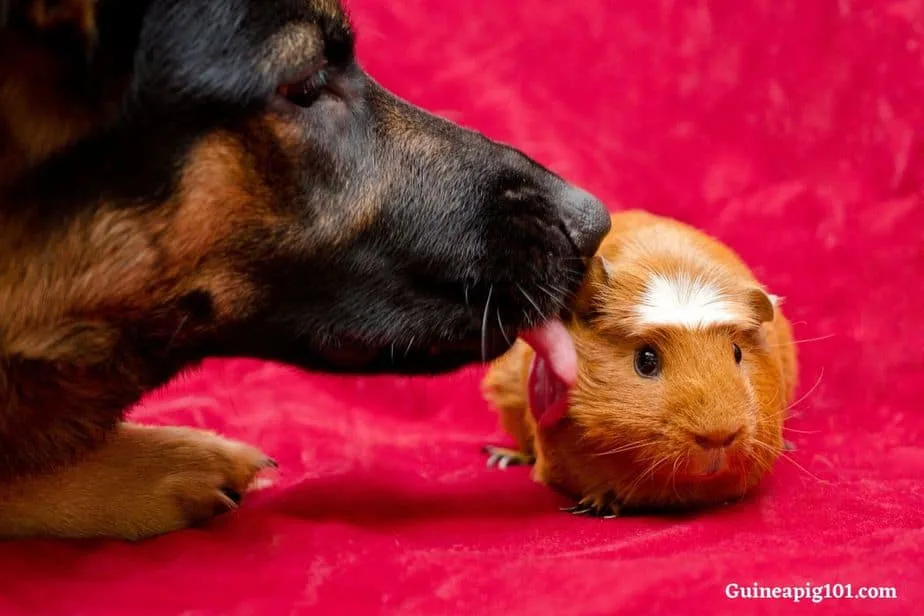
Guinea pigs are always alert from potential threats, and if they feel insecure in any way, then they will run for their life.
The only defense that our guinea pigs have against potential risks is running away and hiding.
Look out for something in their living space that might be frightening them and get rid of the same.
Some common problems include your other household pets like birds, cats, dogs, etc.
Sometimes kids or any visitors whom your guinea pigs are not accustomed to can also frighten them out.
So, make sure you never let any visitors handle your guinea pigs or chase them around their cage as it can stress them out.
You must provide them a sense of security so that they can relax and come out more often.
Shy in nature
Every guinea pig is different, and some guinea pigs do have a shy nature.
If your guinea pig is one of them who has a shy nature, then you must give them some time to get used to things around them.
Many owners see that their friend is cuddling and playing with their guinea pigs, and they think that they will also do the same.
However, there is a possibility that your guinea pigs might not allow you to do so.
Some guinea pigs even refuse to come out of their hiding when someone is around them. This is their nature, and we have to work around it.
Scared of owners
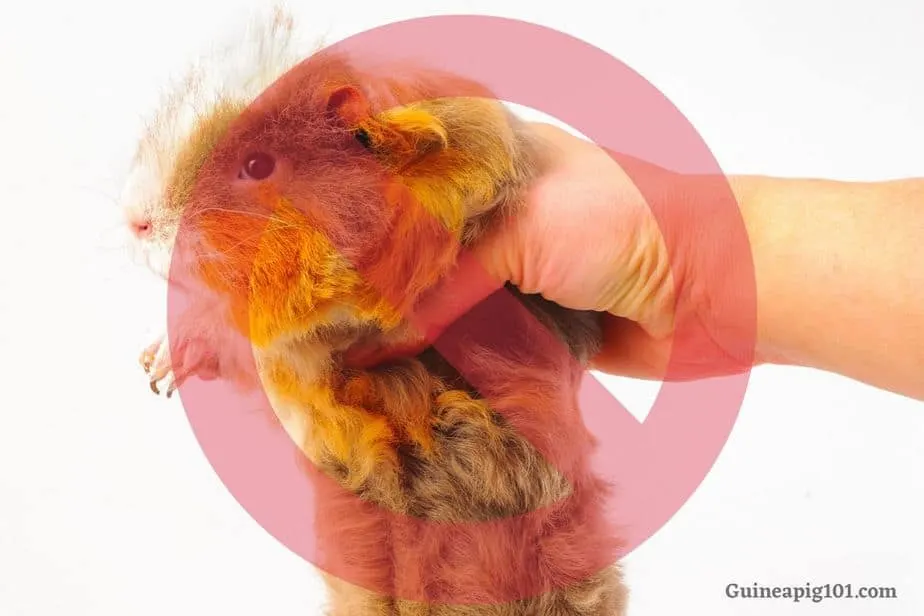
Guinea pigs can get scared pretty easily, and if you have just brought your new guinea pig home, then chances are they are scared of you, and they will not come out when you are around.
You need to introduce yourself slowly to them so that they can get used to you.
Sometimes our sudden movement can frighten them. Some guinea pig owners also try to sneak up on their guinea pigs, but I would caution you not to do so.
Doing so can result in loss of trust, and your guinea pigs might take even longer to get accustomed to your presence.
You should instead not try to touch them or handle them much when you first get them.
Let them get used to their environment so they can come out more often.
Also, if you have kids in your home, you must not allow them to play or handle your guinea pigs in those early days.
It is essential to introduce your guinea pigs slowly to everyone.
They may get overwhelmed if all of your family members get around your guinea pigs.
Sudden loud noises
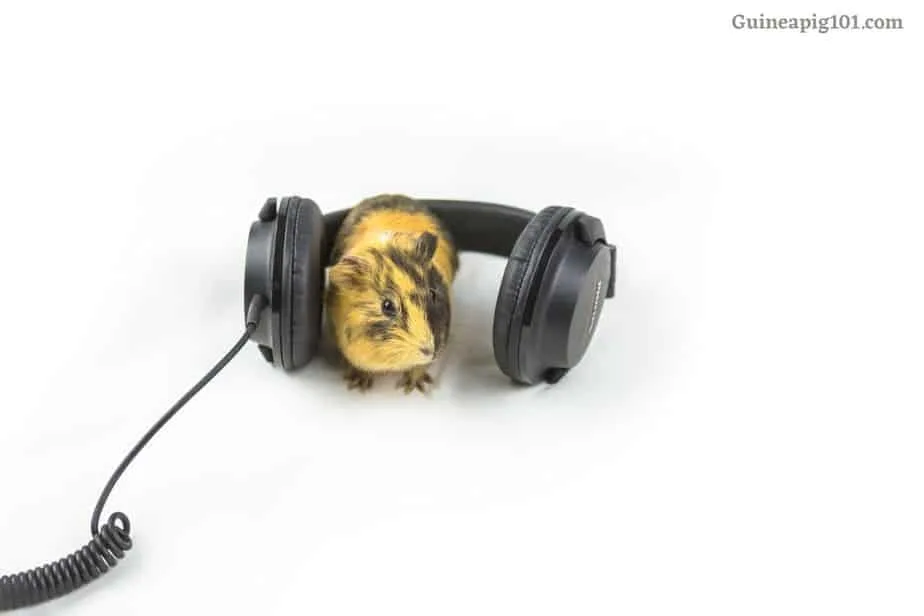
Guinea pigs don’t like loud noises, and any sudden loud noise like a thunderstorm, firecrackers, a passing dumpster truck, etc. can frighten your guinea pigs.
A frightened guinea pig will run for their lives and hide until they feel safe.
So, if your guinea pig is hiding whenever there is a loud noise around them, then it is entirely normal and part of their natural behavior.
Sometimes loud music and television can also frighten your guinea pigs.
Thus, it is recommended to avoid such noises around them.
It is also seen that extended exposure to loud noises can cause some severe health issues in guinea pigs as well.
You can always play soft music around if your guinea pigs enjoy them but avoid any loud sounds.
Keeping a single guinea pigs
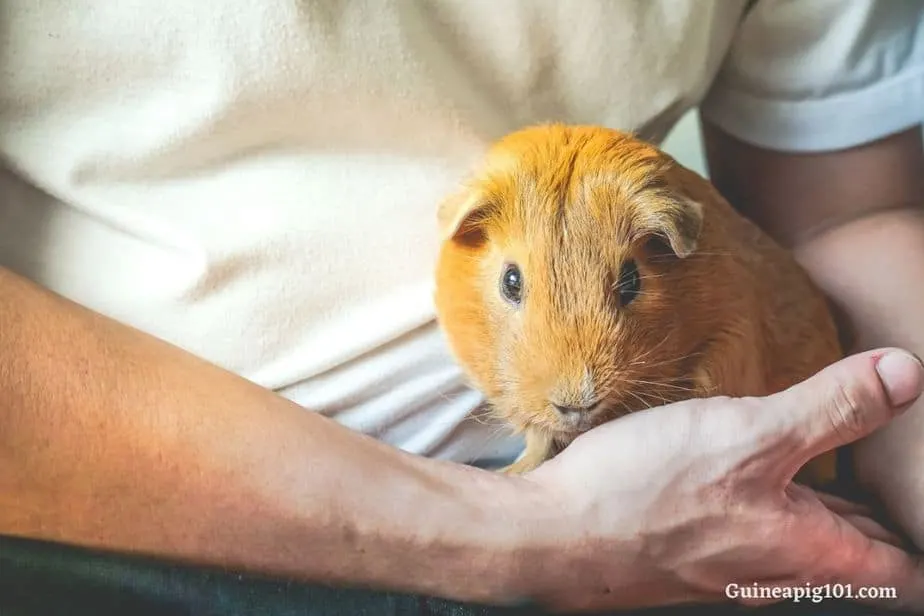
Guinea pigs are herd animals, and they do need a company to live a long and happy life.
If you are keeping a single guinea pig, then chances are they are feeling lonely, lethargic, or maybe even depressed.
Guinea pigs with such symptoms tend to hide all the time and are less active than other guinea pigs.
Some owners say that they provide them with enough floortime and toys to play with, but the reality is it is tough to provide them with interaction, vocalization, and bond that two guinea pigs share.
Thus, your guinea pig may be hiding all the time because they are feeling lonely and depressed.
Sleeping
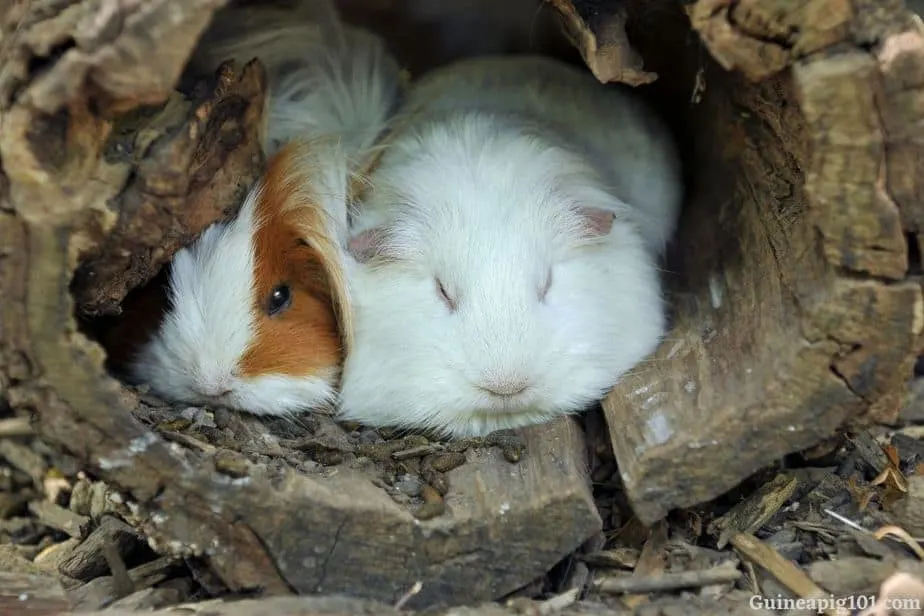
Guinea pigs are always alert, and they won’t sleep with their eyes closed until they feel secure.
You will notice that your guinea pig is hiding and taking a nap, and it is entirely normal for them.
Guinea pigs usually like to get into a comfortable hiding place and take a short nap because they feel much more secure that way.
If your guinea pig is closing their eyes well sleeping, then you should be more than happy as it means they feel content and safe in their living space.
Health problems
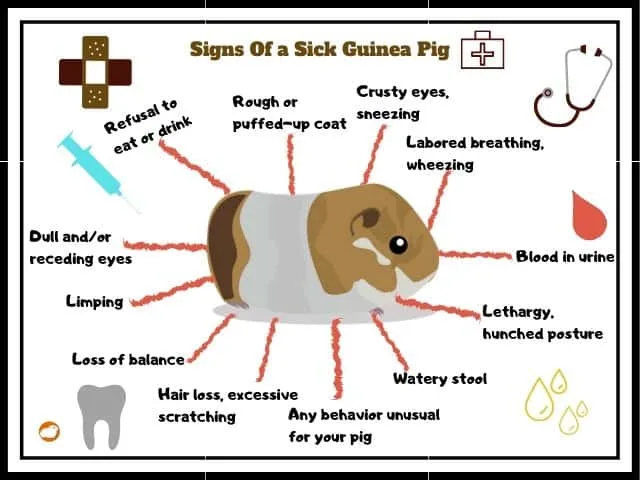
Health problems are not rare in guinea pigs. However, guinea pigs are known to hide their health problems until it gets severe.
This can be a big concern for beginners as they can’t understand what is wrong with their guinea pigs.
Some guinea pigs also hide all the time and will not even come out for eating, and if you see something similar in your guinea pigs, then you must understand that there is a possible health problem in your guinea pigs.
You must look out for other symptoms of health problems and reach out to a vet immediately if you notice anything like this.
Some of the common health problems include dental problems, Respiratory problems, and Gastrointestinal problems.
Most of these will require professional help. Thus, it is recommended to avoid trying any home remedies and approach a vet.
How do I stop my guinea pig from hiding?
To get your guinea pigs out from the hiding, you must first understand why is your guinea pig hiding?
Once you have figured out the right cause, you can take appropriate action to get them out.
Let us have a look at some possible solutions to get your guinea pigs out from the hiding.
Well maintained living environment
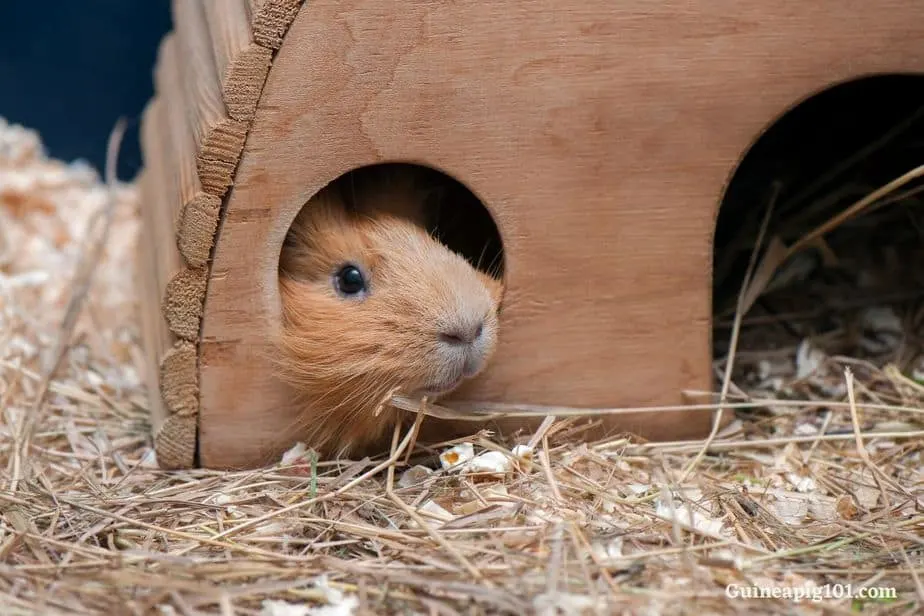
Once your guinea pig feels like home, they are more likely to explore their living environment.
Make sure the living environment is clean and safe for your guinea pigs.
Also, place the cage at the central part of your home where heat and cold waves don’t affect them much.
Avoid loud noises, kitchen fumes, and other strong smells around your guinea pig’s living space.
These can easily stress them out, and as a result, your guinea pigs are more likely to remain inside hiding.
Hand feeding your guinea pigs
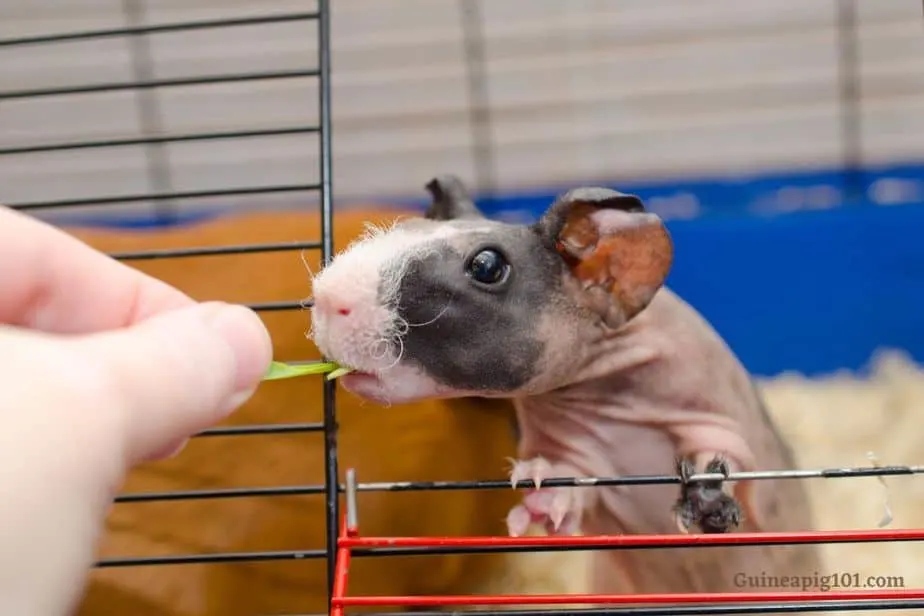
The way to your guinea pig’s heart goes through their stomach. Although this may sound a little cheesy, but it is a fact that guinea pig associates good things with food.
This means if you feed them veggies or treats like carrots, watermelon, pea flakes, etc. then they will get used to you quickly.
Hand Feeding your guinea pigs also builds a strong bond with them, and they are more likely to come out and wheek and play with you rather than hiding when you are around.
However, don’t overfeed them with treats as they are bad for their health in the long-run.
You can start with some treats and replace them with veggies as your guinea pigs get accustomed to it.
Provide more floortime

Guinea pigs are active animals, and they do need a lot of space to eat, play, and exercise.
If your cage doesn’t provide them with enough space, then you must consider providing them with some floortime.
Floortime not only makes them active but also allows them to interact with new elements in their environment.
It is also helpful in the introduction of other family members or friends during the process, which makes them less likely to hide in the foreseeable future.
Apart from that, your guinea pigs will also remain healthy and active if they are provided enough space and time to play and exercise.
Don’t chase them around to catch them
Guinea pigs are fluffy and cute little pets, and often their owners want to cuddle and pet them.
However, not all guinea pigs enjoy the same. Sometimes a new owner tries to hold them, and when guinea pigs are not willing to come on their own, they chase them around to get a hold of them.
Doing so can stress your guinea pigs out, and you will lose the trust you are trying to build.
Thus, you should never chase your guinea pigs around the cage to get a hold of them.
Instead, it should be the other way around. Offer some attractive treats and snacks from your hand by keeping a distance.
Let your guinea pigs come towards you and never try to chase them around.
Have patience
Guinea pigs make a lovely pet if you take good care of them and have some patience while training them.
Not all guinea pigs carry the same nature; thus, it is crucial to understand the nature of your guinea pigs and give them time to adjust to their environment and your presence.
If you try to rush things, then it can be challenging to develop a good bond between you and your guinea pigs.
Patience is the key when it comes to building a bond and training your pets.
Have patience, make a good bond with your pet, and provide them with adequate living space, and your guinea pigs will be around you all the time.
Guinea pigs only run away and hide when they see you as a threat. So, building a good bond is the key to fix the problem for once and all.
Get a pair of guinea pigs or more
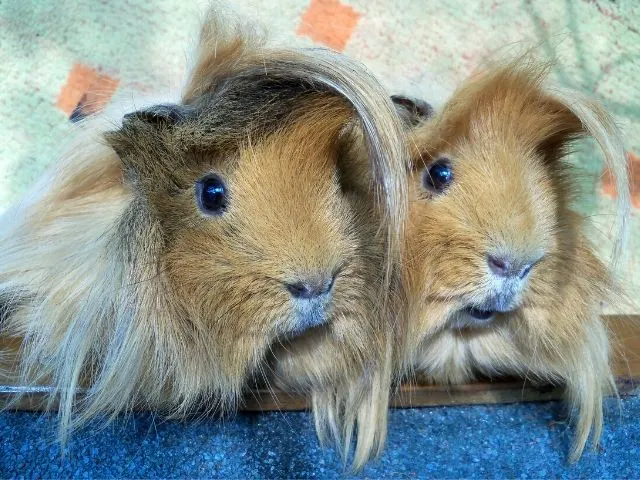
Guinea pigs are social animals, and they do enjoy living in a group of two or more.
Getting a single guinea pig can be a bad idea, primarily if you cannot provide enough attention to them.
In most scenarios, having more than one guinea pig is ideal. When kept in groups, your guinea pigs will remain active and happy, and thus they will not hide anymore.
Occasional nap or games around their hiding is usual.
Still, if you feel your guinea pig is lonely and not active, then probably they need a partner, and getting them a good partner will encourage them to come out and play and exercise.
Visiting a vet
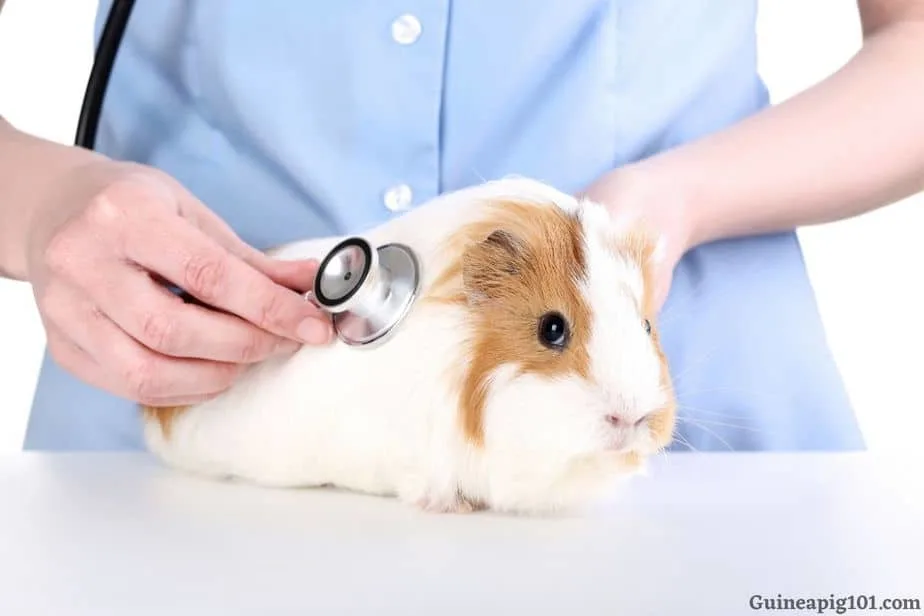
Guinea pigs are known for hiding their health problems, and so it is crucial to visit a professional vet who can look out for signs of those issues and treat them accordingly.
Guinea pigs are fragile creatures when it comes to their health. Their health can go from good to bad in a matter of 24-48 hours.
So, paying close attention to their health and reaching out to a vet if you find any health issue is critical.
Sometimes the health issues are not apparent, and you must look out for other signs like loss of appetite, losing weight, lethargy, hiding a lot, etc.
If you see those signs accompanying your guinea pigs, then it is certain that they need medical care immediately.
Sources: Dental Disease and Periodontitis in a Guinea Pig, Heatstroke in guinea pigs, Heatstroke: opioid-mediated mechanisms, A suitable environment for guinea pigs, CARING FOR YOUR GUINEA PIG, RESPIRATORY INFECTION, Nutrient Requirements of the Guinea Pig, The effects of diet on guinea pigs, Guinea Pig Diet, Patterns of feeding in the Guinea pig.
